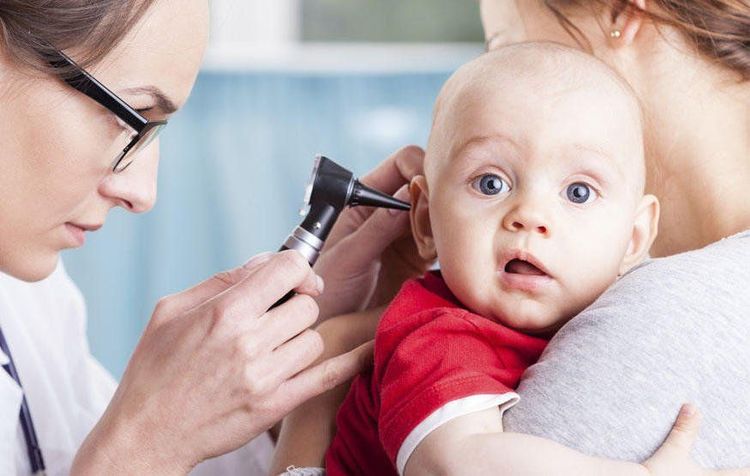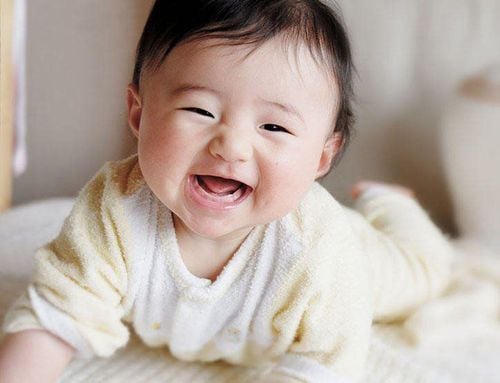This is an automatically translated article.
The article was consulted with MSc Duong Van Sy - Department of Pediatrics - Neonatology, Vinmec Hai Phong International General Hospital.Deaf children are children with different degrees of damage to their hearing organs. Because the hearing organ is damaged, the child cannot perceive the world of sound, cannot hear voices and cannot form language. If children with hearing loss are detected early and cared for and supported with special methods, they will have the opportunity to develop their inherent abilities.
1. Causes of hearing loss in children
Causes of hearing loss in children can originate before, during and after birth:1.1 Causes occurring before birth Congenital: Ear deformity, ear defect Due to infection during pregnancy (flu) , measles or other viral diseases). A family history of hereditary hearing loss that causes the inner ear to develop abnormally. 1.2 During delivery Preterm birth less than 6 months Low weight less than 2kg Brain injury due to obstetric intervention. 1.3 After giving birth Due to infections: meningitis, measles, mumps, encephalitis. Inflammatory ear diseases: Acute or chronic otitis media. Due to auditory neurotoxicity caused by some drugs (gentamicin, streptomycin, quinine..) Head trauma, head injury such as concussion or skull fracture. When children have the diseases mentioned above, if they see signs of hearing loss, ear discharge or pain in the ear, parents need to take the child to an ENT specialist unit for examination and treatment.

2. Signs of hearing impaired children
Signs of hearing loss vary from child to child and the degree of hearing loss in children also varies. Some babies may be fussy and lose their temper at any sound, while others are normal, and even show no signs of abnormality at all. However, parents can recognize signs of a hearing impaired child through the following expressions:2.1 For infants – 3 months old Do not startle when suddenly hearing loud sounds. There isn't any response to sounds, music or voices. There is no indication towards the source of the sound. Not feeling comfortable with melodious, mellow sounds. Do not move or wake up to voices or noises while sleeping in a quiet room. After 2 months, children still can't pronounce simple vowels such as oh, a... Hearing familiar voices but feeling new and unsettled. 2.2 For children 4 - 8 months old Do not turn your head or direct your eyes to a sound source that the child cannot see. In a quiet environment, the child does not change expression to different voice volumes or loud noises. Not interested in rattles, bells, or noisy toys. At 6 months old, your baby does not try to imitate to make a certain sound. Children are bewildered when listening to talk, often have to ask questions again or have to look at their mouths to guess words. Don't know how to "babble" to yourself or reflect when others talk. There is no response when hearing the "no/no" command as well as sensing the tone of speech. Seems to hear only certain sounds Feels vibrations but only certain sounds Returns just because the parent is seen and not called by the parent, it may be mistaken for a child ignoring or being distracted. This could be a sign of complete or partial hearing loss. 2.3 For children from 9 - 12 months

3. Diagnostic measures

Step 1: Let the child lie on his or her back on the bed, the tester stands on the other side. young head, half a meter away.
Step 2: Perform clapping, or shake the dice... to make a sound to see if the child turns his or her head in that direction. Repeat 3 times and observe the child's reaction.
3.2 Test the hearing ability of children over 3 years old Step 1: Let the child sit with his back to the tester, cover each ear in turn and turn to the opposite side to say a single word, speaking at normal intensity for the child to repeat . If the child repeats 4-5 times, all are correct, the hearing can be considered normal.
Step 2: Repeat with the opposite ear.
Step 3: If it is found that the child speaks incorrectly, or cannot repeat the speech sounds, it is necessary to send the child to a reputable specialized unit for hearing measurement.
3.3 Audiometry The purpose of audiometry is to assess a child's hearing accurately, find out the cause of the child's hearing loss. From there, choose a remedy: let the child wear a hearing aid or have surgery. Help choose the right hearing aid for your child.
Children with hearing loss, if detected early and cared for in time, have a high chance of recovery, especially for children under 2 years old. Therefore, when seeing a child showing signs of hearing loss, parents should take the child to a reputable hospital and facility for hearing tests, thereby offering appropriate treatment methods.
Currently, at Vinmec International General Hospital, there is a service of monophonic audiometry and tympanometry. These are objective methods that can be used in uncooperative situations, especially with young children. Steps to perform hearing test with KARNSTORCH audiometer imported from Germany. Working with audiologists will determine what type of hearing loss your child has with an audiometric test. An audiologist is someone specially trained to do hearing tests and hearing treatment.
As a key area of Vinmec Health system, Pediatrics Department always brings satisfaction to customers and is highly appreciated by industry experts with:
Gathering a team of top doctors and nurses in Pediatrics : consists of leading experts with high professional qualifications (professors, associate professors, doctorates, masters), experienced, worked at major hospitals such as Bach Mai, 108.. Doctors All doctors are well-trained, professional, conscientious, knowledgeable about young psychology. In addition to domestic pediatric specialists, the Department of Pediatrics also has the participation of foreign experts (Japan, Singapore, Australia, USA) who are always pioneers in applying the latest and most effective treatment regimens. . Comprehensive services: In the field of Pediatrics, Vinmec provides a series of continuous medical examination and treatment services from Newborn to Pediatric and Vaccine,... according to international standards to help parents take care of their baby's health from birth to childhood. from birth to adulthood Specialized techniques: Vinmec has successfully deployed many specialized techniques to make the treatment of difficult diseases in Pediatrics more effective: neurosurgery - skull surgery, stem cell transplantation. blood in cancer treatment. Professional care: In addition to understanding children's psychology, Vinmec also pays special attention to the children's play space, helping them to have fun and get used to the hospital's environment, cooperate in treatment, improve the efficiency of medical treatment.
Please dial HOTLINE for more information or register for an appointment HERE. Download MyVinmec app to make appointments faster and to manage your bookings easily.














